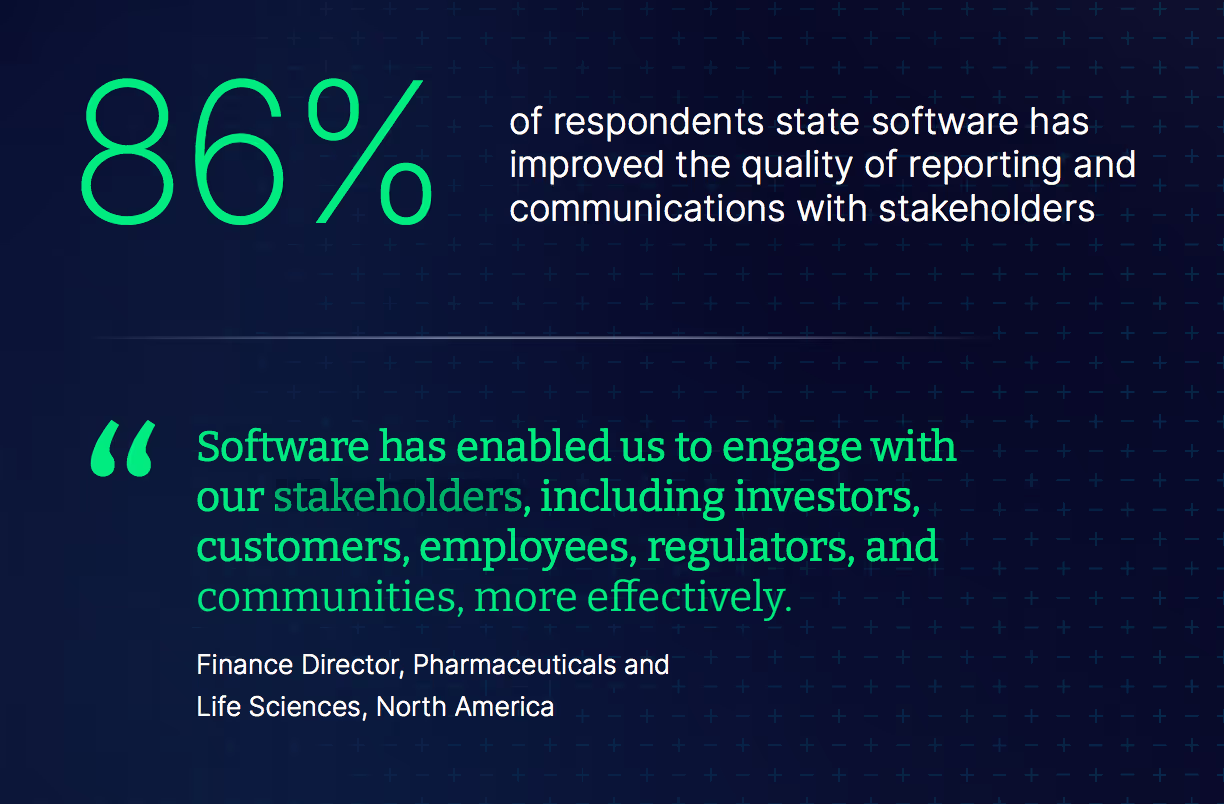As contemporary businesses find themselves at a precarious crossroads between profit maximisation and commitment to sustainability, understanding and harnessing the power of a poorly understood indicator can resolve this 21st-century predicament.
The return on investment (ROI) of sustainability is a metric that refers to the gains achieved from implementing sustainable practices and initiatives.
The ROI of sustainability differs from traditional understandings of ROI since it incorporates factors beyond the financial realm. Ingeniously, the ROI of sustainability is a tool that quantifies the business, societal, and environmental benefits that result from sustainable practices and initiatives–in addition to their financial profitability.
Why is it crucial for companies to understand the ROI of sustainability?
The world is shifting towards sustainable and environmentally conscious practices, and rightfully so. The decade 2010–2019 holds the title of hottest decade on record. According to the United Nations, weather-related events displace an estimated 23.1 million people annually.
As the alarming spectre of climate change advances, it produces extreme weather conditions, natural disasters, rising oceans, species loss, and climate-related poverty and displacement. It’s no wonder companies are under increasing pressure from customers, stakeholders and regulators to demonstrate their commitment to sustainability.
Companies can quantify the impact of their sustainability initiatives to make informed decisions that balance environmental impact with economic performance and business KPIs.
The ROI of sustainability can serve as a critical metric for evaluating the success of sustainability initiatives, enabling companies to refine their strategies and improve their overall performance.
The financial ROI of sustainability
The financial ROI of sustainability refers to the quantifiable economic benefits that a company gains from investing in sustainable practices, measured against the costs of those investments. This is very similar to the traditional understanding of ROI.
This metric helps businesses assess the financial viability of sustainability initiatives, guiding investment strategies that align with long-term profitability and risk management.
Taking the lead in sustainability pays off. In 2021, ESG leaders saw 8% higher returns than the broader U.S. market. Additionally, companies with high ESG scores receive discounts on the cost of capital, 10% on average, compared to those with lower scores.
According to McKinsey & Company, products that make environmental, social, and governance-related claims have achieved disproportionate growth compared to those without.

Credit: McKinsey
Companies that effectively measure and report their sustainability ROI can attract investors increasingly focused on environmental, social, and governance (ESG) criteria, enhancing their market position and financial performance.
A study from the consulting cabinet EY indicates that 89% of institutional investors now incorporate ESG data into their decision-making, showcasing the financial viability of sustainability initiatives. Over 15 years, sustainability programs, on average, have increased shareholder value by $1.28 billion.
Key financial elements include:
- Energy savings and efficiency improvements: Investments in energy-efficient technologies can lead to significant cost savings on utility bills and reduce operational costs.
- Access to capital and green financing opportunities: Companies committed to sustainability may qualify for green bonds, governmental and international subsidies and grants, tax incentives, and other financing options that offer lower interest rates due to reduced risk profiles.
- Reduction of climate risks and associated costs: By addressing climate-related risks, companies can mitigate potential financial losses from regulatory changes, supply chain disruptions, and reputational damage. This risk reduction supports long-term viability.
Integration of sustainability into business strategy has been shown to enhance profitability by attracting new investors, cutting costs and reducing climate risks.
With the right initiatives in place, it’s possible to help solve the climate crisis while enhancing profitability. Find out the financial and environmental outcomes of your company’s sustainability initiatives with Plan A’s end-to-end decarbonisation software.
The benefits of sustainability initiatives
The positive impact on employees and stakeholders
Beyond financial gains, sustainability initiatives can lead to broader business benefits, such as enhanced market positioning by aligning with consumers’ preferences for environmentally responsible companies. Committing to sustainability gives companies a competitive advantage over less sustainable competitors.
Sustainability commitments open up an opportunity to improve relationships with stakeholders by clearly measuring and communicating sustainability efforts to investors, regulators, and customers. This kind of communication can lead to enhanced transparency and trust, thus increasing shareholder loyalty and investment.
During this critical time, a company’s sustainability efforts seriously impact employee satisfaction and retention. According to the BBC, a recent survey found that 35% of UK office workers who were questioned were willing to quit their jobs because of their employers’ weak climate action.
According to a study led by 5 American researchers available at the National Library of Medicine, acknowledge that a company is making a positive impact on the environment :
- Improve employee motivation;
- Increase productivity;
- Enhance collaboration;
- Attract top talent
Brand enhancement and access to customers
Now more than ever, consumers are choosing brands that demonstrate a commitment to sustainability, influencing purchasing decisions in B2C markets.
Furthermore, many businesses, especially in B2B markets, increasingly require sustainability credentials from their suppliers as part of their procurement processes, making a commitment to sustainability all the more vital.
Committing to sustainability can enhance companies’ competitiveness and reputation, attract investors, and improve customer loyalty.
The societal ROI of sustainability
The societal ROI of sustainability refers to the quantifiable benefits an organisation gains from its sustainability initiatives, particularly regarding measurable social and community impacts.
This metric empowers businesses to understand how their sustainability efforts contribute to building strong community relations and fulfilling their social responsibilities.
By measuring the societal ROI of sustainability, companies can demonstrate their commitment to social equity, community well-being, and environmental stewardship. This can lead to increased trust and loyalty from stakeholders.
Key societal benefits include:
- Improved community relations: Engaging with local communities can lead to stronger partnerships and support for business operations.
- Enhanced corporate social responsibility (CSR): Companies that actively contribute to societal well-being can improve their public image and stakeholder trust.
- Contribution to social equity and justice: Sustainability initiatives can address social disparities, promoting inclusivity and fairness within communities.
The societal benefits of sustainability initiatives can translate into long-term business advantages in several ways.
Improved community relations can lead to a more supportive local environment, reducing operational risks and fostering a favourable business climate.
By contributing to social equity and justice, companies can mitigate potential social unrest and create a more stable operating environment, ultimately leading to sustained profitability and growth.
It’s hard to forget that one of the most significant reasons to embrace sustainability is the potential lifesaving ramifications for future generations of humanity. Today’s decision-makers will make or break the fate of future generations who are anticipated to bear the greatest costs of climate change.
The environmental ROI of sustainability
The environmental ROI of sustainability refers to the quantifiable environmental benefits stemming from investments in sustainability initiatives. In particular, this can refer to the benefits of reducing carbon emissions and decarbonisation–contributing to the planet’s overall well-being and compliance with regulatory requirements.
Decarbonisation efforts, which focus on eliminating or significantly reducing carbon emissions, are essential for achieving long-term sustainability goals and aligning with global climate targets, such as those outlined in the Paris Agreement.
Carbon management strategies
Companies can adopt several carbon management strategies to enhance their environmental ROI, including:
- Conducting a GHG inventory: This involves measuring and reporting emissions from all scopes (Scope 1, 2, and 3) to identify major sources of emissions and track progress over time.
- Setting science-based targets: Establishing GHG reduction targets aligned with climate science helps companies focus their efforts on meaningful reductions.
- Implementing energy efficiency measures: Upgrading equipment, optimising processes, and investing in energy-efficient technologies can significantly lower energy consumption and associated emissions.
- Investing in renewable energy: Transitioning to renewable energy sources can reduce reliance on fossil fuels and lower Scope 2 emissions.

Credit: Plan A
Plan A offers its users a certified carbon management platform, enhanced by personalised expert services, that helps companies reduce emissions. For a glimpse into your company’s greenhouse gas emissions, try out Plan A’s free carbon scanner.
Decarbonisation initiatives
Decarbonisation removes or reduces all human-made carbon emissions into the atmosphere. This can be achieved through cross-cutting measures to reduce or eliminate carbon emissions from an organisation’s activities.
In its aim to reduce absolute carbon emissions and intensity, decarbonisation differs from climate neutrality and carbon offsetting, which can mask ongoing emissions. Genuine emissions reductions are critical for achieving long-term sustainability goals and maintaining credibility with stakeholders, including investors and customers.
Effective decarbonisation initiatives may include:
- Investing in low-carbon technologies: Companies should explore innovative solutions that reduce emissions.
- Enhancing product design: Developing products with lower carbon footprints can drive demand and improve market competitiveness.
- Adopting circular economy principles: Implementing practices that reduce waste and promote resource efficiency can reduce emissions.
How can companies measure the ROI of their sustainability initiatives and strategy?
Measuring the ROI of sustainability initiatives is crucial for companies to understand the financial benefits of their environmental and social governance investments. It helps justify expenditures, attract investors, and enhance corporate reputation.
However, companies face several challenges in this process, including the lack of standardised metrics, difficulties in quantifying intangible benefits, and the complexity of data collection across various departments and supply chains.
Additionally, the evolving nature of sustainability regulations and stakeholder expectations can complicate ROI assessment.
Use our new Decarbonisation Savings Calculator to estimate your potential savings.

Ideas and challenges to measuring sustainability ROI
There are multiple ways to measure the ROI of sustainability.
- Utilising ESG accounting software: This software tracks emissions and assesses the financial implications of carbon reduction strategies.
- Conducting lifecycle assessments: These assessments evaluate the environmental impacts of products throughout their lifecycle, providing insights into cost-saving opportunities.
- Setting clear sustainability targets and KPIs: Establishing specific, measurable, achievable, relevant, and time-bound targets allows companies to track progress and assess the financial impact of their environmental initiatives.
Using ESG accounting software delivers benefits across the board. According to a recent NASDAQ survey of global executives at companies that use ESG accounting software, 86% of respondents state that software has improved the quality of reporting and communications with stakeholders.

Credit: NASDAQ
Common challenges in measuring the ROI of sustainability initiatives include data availability and standardisation issues. Since no universally accepted framework for measuring sustainability exists, ROI leads to consistency in reporting and benchmarking.
Furthermore, the difficulty of quantifying non-financial benefits, like improved employee morale or enhanced brand reputation, complicates the assessment process. Companies may also face resistance from stakeholders who are sceptical about the financial benefits of sustainability initiatives.
Best practices to maximise the ROI of corporate sustainability
Companies can enhance their sustainability ROI by adopting various best practices focusing on efficient resource management, stakeholder engagement, and continuous improvement.
These practices include leveraging technology for accurate emissions tracking, implementing science-based decarbonisation strategies, and actively engaging stakeholders in sustainability initiatives.
Key practices include:
- Implementing science-backed decarbonisation strategies: Companies should set science-based targets aligned with climate science to guide their emissions reduction efforts.
- Engaging stakeholders in sustainability initiatives: Involving employees, customers, suppliers, and investors in sustainability efforts can enhance collaboration and drive collective action towards common goals.
- Leveraging carbon accounting software for accurate emissions tracking allows companies to monitor their greenhouse gas emissions in real-time, identify reduction opportunities, and ensure compliance with regulations.
Continuous improvement and adaptation are crucial for maximising the ROI of sustainability initiatives. This involves staying informed about emerging technologies, regulatory changes, and market trends that could impact sustainability efforts.
Key takeaway: Effective carbon management is crucial for maximising the environmental ROI of sustainability. It involves strategies to measure, reduce, and report greenhouse gas (GHG) emissions across a company's operations and supply chain.
By aligning sustainability efforts with business objectives, companies can reduce their social-environmental impact while improving their financial performance, brand reputation, and competitive advantage.
In its many facets, the ROI of sustainability is a powerful metric that can align companies’ KPIs with today’s vital sustainability demands. By properly utilising this tool to analyse business strategy and sustainability impact proactively, companies can maintain a competitive advantage and successfully adapt to changing markets and regulations.
Plan A is a software provider that guides European businesses through their entire decarbonisation journey, turning them into leaders of tomorrow’s net-zero economy. The certified carbon management platform, along with expert support and service partners, helps businesses manage carbon accounting, report on CSRD, and decarbonise operations and value chains more efficiently and effectively.
Sign up for a free demo of Plan A’s sustainability software, and maximise your ROI.




.jpg)

.webp)

